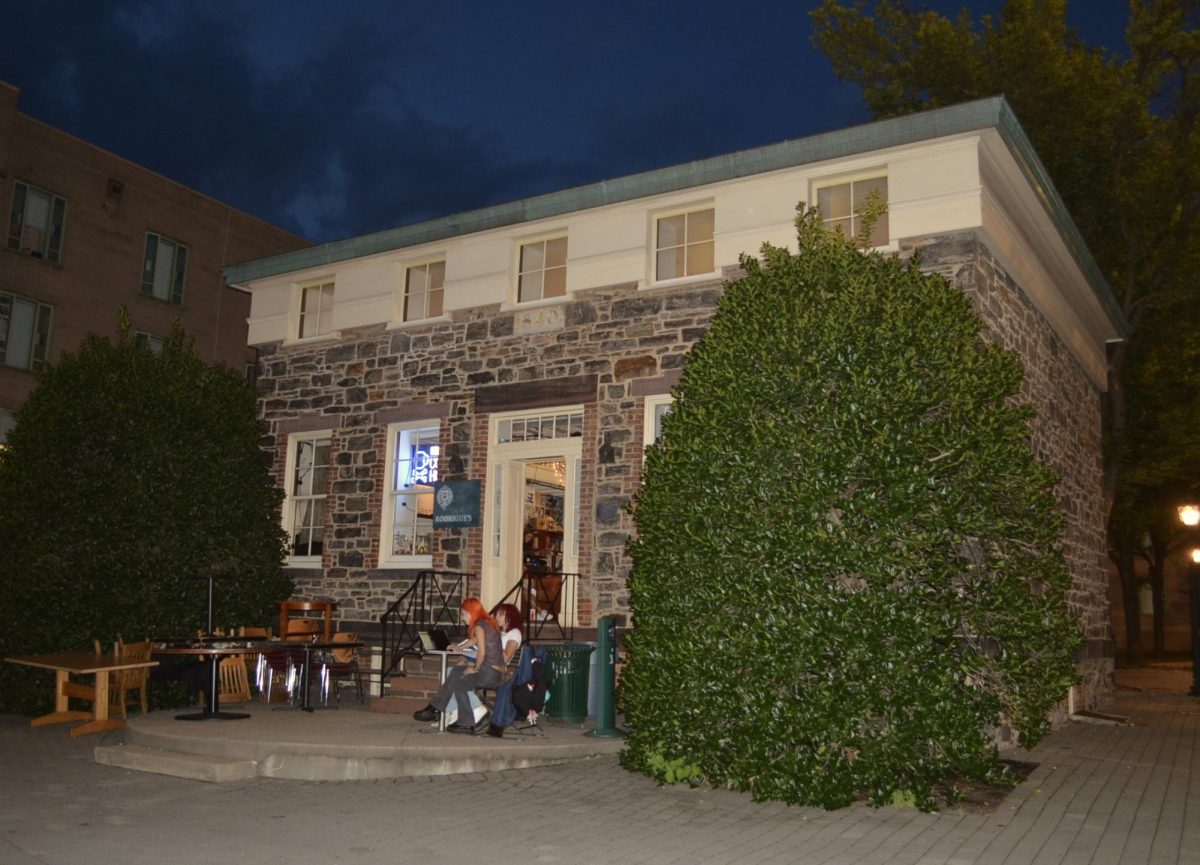In Rodrigue’s Coffee House basement this past Thursday, Feb. 9, Fordham University’s inaugural HumanitiesFest took place. The event was organized by the Humanities Consortium, a Fordham initiative aimed at creating and hosting events that celebrate the humanities.
Dr. Nathan Lincoln-DeCusatis, faculty director of the Humanities Consortium, was the primary organizer of the HumanitiesFest. He worked closely with the Humanities Student Ambassadors (HSA) and Rodrigue’s to promote and run the event. Lincoln-DeCusatis chose to hold the event at Rodrigue’s.
“It’s a great performing arts venue,” he said. “[I like] the warm environment and informal vibes.”
The HumanitiesFest was a celebration of Fordham’s student artists, musicians and humanities scholars. But beyond that, it was a celebration of the Fordham Humanities community.
As Lincoln-DeCusatis put it, “The humanities focus on and really highlight the great things students are doing on campus.” This community has become even more important considering the “recent political issues and negative press surrounding the field.”
Lincoln-DeCusatis’s message seemed to resonate with his colleagues, prompting many not only to promote the event but also to attend personally. Among them was Dr. Nina Rowe from the Art History department.
“[I came] to see the students majoring in humanities showcase their amazing talent,” said Rowe.
The HumanitiesFest opened with Malena Sullivan, FCRH ’26. Sullivan is one of Rowe’s students and was personally recommended by Rowe to present her independent research paper on Joseph C. Leyendecker.
Her presentation, titled “J.C. Leyendecker: Visual Storytelling,” showcased the defining effects Leyendecker had on American culture, influencing modern trends by proving that “sex sells, especially in male fashion.” Sullivan illustrated how Leyendecker is behind many modern marketing tactics, his most famous being the “Arrow Collar Man.” This was an example of “aspirational mascot marketing,” showing consumers an idealized version of themselves.
“Men wanted to be him, and women wanted him,” said Sullivan. She underscored Leyendecker’s role in creating what has come to be known as the “Americana man” and in “defining American masculinity.”
Jake Metcalf, FCRH ’25, was the next presenter. His presentation was titled “Architectural Design, Sustainable Independence, and the Art of Purging Expenses.” Metcalf shared his summer research experience, where he learned about architecture and sustainability by interviewing industry leaders such as Mary Miss, Claudio Silvestrin and Kengo Kuma. He presented each artist’s style, from Mary Miss’ environmentally integrative minimalist architecture to Kengo Kuma’s use of Japanese techniques with locally sourced wood.
“Sustainable architecture comes with acknowledging the industrial and ecological sites,” said Metcalf. “I just emailed like 15 people. When you reach out to people with an email starting with ‘Fordham summer research,’ a lot of people are more than willing to take 20-30 minutes of their day to talk about their work.”
The final presenter was Clare O’Connell, FCRH ’25. O’Connell is a music and American studies double major with a minor in disability studies. In her presentation, she shared her experience studying abroad in Vienna. Her presentation was entitled “Exil Arte, the Center for Banned Music.”
“[It was an effort to] collect music from those who were forced to flee Austria during or after the events of World War II,” said O’Connell.
O’Connell discussed the evolution of music in Austria from Dadaism, “an art movement criticizing the war and what people used to value,” to New Objectivism and Neoclassicism, “music for music’s sake.” She also covered the first and second Viennese schools of music and twelve-tone theory. O’Connell delved into the different ways art and music were expressed in Austria, ultimately focusing on Erich Korngold, whose music influenced iconic compositions like the themes from “Jurassic Park” and “Star Wars.” She concluded her presentation and the event with a piece by Korngold, “Come Away, Death,” described by some as a “goosebump-inducing performance.”
“[It was] inspiring watching people share their interests while highlighting the student body’s passion,” said Lily Partuzo, FCRH ’25.
Lincoln-DeCusatis hopes to continue celebrating the humanities student body by creating a platform for the talented Fordham community. He plans to keep hosting HumanitiesFests and aims to have three a semester to promote student research.
“Often the best opportunities are the ones you create for yourself,” said O’Connell.







































































































































































































